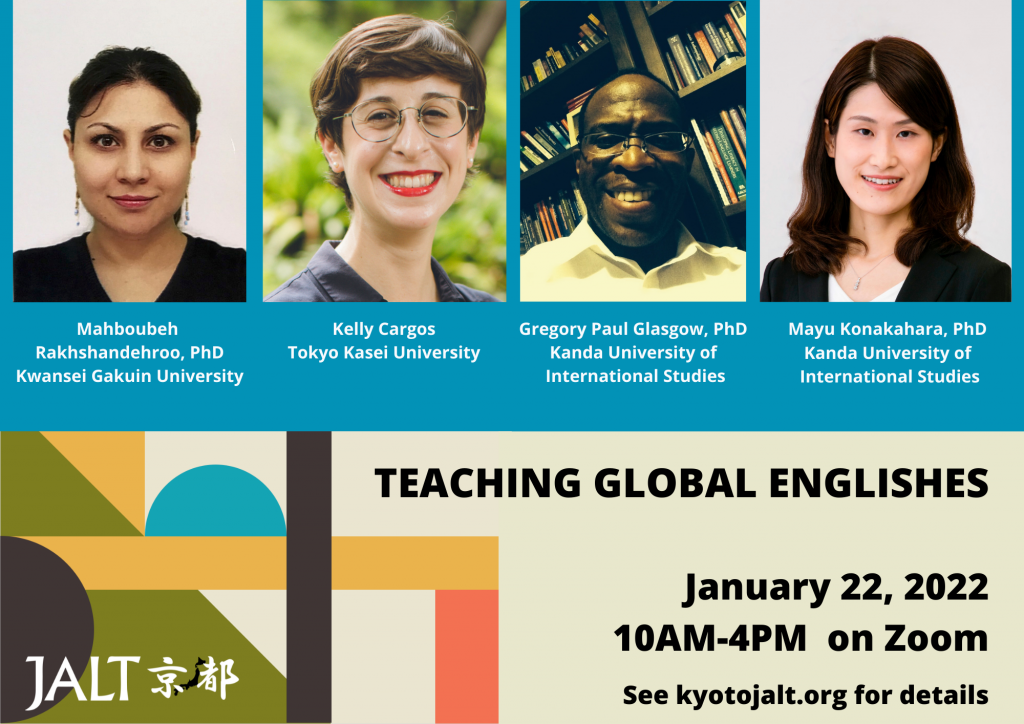Teaching Global Englishes – Shared resources and slideshows available!
This event took place on January 22, 2022. Abstracts and copies of presenters’ slideshows are available for review below.
Schedule (in JST)
- LUNCH

10:00 – 11:00
Global Englishes, Unequal Englishes, and Language Teaching in a ‘Multicultural’ Japan: Paradoxes and Possibilities
Gregory Paul Glasgow, Ph.D.
Kanda University of International Studies
Proponents of the Global Englishes (GE) paradigm (Rose & Galloway, 2019) have encouraged TESOL educators, educators, and learners alike to appreciate the lingua-cultural diversity of the English language and its speakers worldwide. While such an approach has the potential to further promote the idea of English as a multicultural tool for communication in English Language Teaching (ELT) in Japan, native speakerism in Japanese ELT remains resilient, as standard language ideologies reinforce inequities in language policy and pedagogical practices. Drawing from the theoretical concepts of Unequal Englishes (Tapas, 2015), raciolinguistics (Alim et. al. 2016) and from my own research and pedagogical initiatives, I stress the urgent need for GE-informed pedagogy and practice in ELT that works to dismantle linguistic discrimination and inequality between Englishes and their users.
Dr Gregory Paul Glasgow (Ph.D, The University of Queensland, Australia) is an Associate Professor in the Department of English at Kanda University of International Studies. He takes an interdisciplinary approach to the study of the politics of Global Englishes in TESOL. Drawing on social theory and critical applied linguistics, he is interested in the interplay between structure, culture, and teacher agency in ELT policy and pedagogy, with special consideration of issues concerning race, multiculturalism, and diversity.
11:30 – 12:30
Global Englishes Language Teaching: Real-world applications
Kelly Cargos
Tokyo Kasei University
The Global Englishes Language Teaching (GELT) framework (Rose & Galloway, 2019) was created not only to assist researchers, but also to guide English language teachers and school administrators who wish to implement pedagogy aligned with the Global Englishes paradigm. Yet in the real world, how do we use this framework to pursue curricular innovation? In this interactive, collaborative workshop, we will consider how GELT is relevant in our respective classrooms. We will also discuss and share practical applications of the GELT framework, drawing from relevant research and from our own ideas and experiences.
Kelly Cargos is a Special Lecturer in the Global Education Center at Tokyo Kasei University. She received her MSc in Applied Linguistics for Language Teaching at the University of Oxford. Her research interests are in Global Englishes, teacher training, and English user identities.
LUNCH
13:30 – 14:30
Revisiting Native-Speakerism: Internationalization Initiatives in Practice
Mahboubeh Rakhshandehroo, Ph.D.
Kwansei Gakuin University
The terms internationalization and English native speakerism have been researched in a variety of contexts. Nevertheless, little has been done from a bottom-up standpoint. This presentation aims to show how these concepts are contested in practice. It combines document analysis of university internationalization policies with insights into practice gained through an online questionnaire (N=298) and in-depth interviews (N=10) with Japanese university students. By focusing on the micro-level, it will discuss the ways policy documents and students’ perceptions have associated native English with a culturally “superior” ideology, both in terms of English and pedagogy (Holliday, 2018). Nevertheless, students’ answers to open-ended questions of the questionnaire as well as their answers to the interview questions highlight positive attitudes towards different varieties of English and show that they have the potential to revisit the ideology of native-speakerism. Based on the study findings, this presentation will attempt to suggest pedagogical practices to move beyond native-speakerism in Japanese universities.
Mahboubeh Rakhshandehroo received her PhD in Human Sciences (Critical Studies in Transformative Education) from Osaka University. She is currently an Associate Lecturer of English at Kwansei Gakuin University. She is also the ICLHE East Asia leadership team coordinator. Her research interests include English-Medium Instruction (EMI) support, native speakerism, and multiculturalism.
15:00 – 16:00
Tackling a Monolingual View of English among Japanese University Students through ELF-Informed Instruction: What, How, and Afterward
Mayu Konakahara, Ph.D.
Kanda University of International Studies
Despite the heterogeneity in society due to globalization, English is still frequently viewed as a static monolingual entity and a possession of its native speakers (Lowe & Pinner, 2016; Widdowson, 1994). The monolingual view of English is also manifest in Japanese people’s attitudes toward English; their strong endorsement for its native varieties and their abasement of its non-native varieties, including their own, were frequently reported in language attitude research (e.g., Chiba et al., 1995; Tokumoto & Shibata, 2011). ELF-informed instruction, adopting a transformative approach (Sifakis, 2014), seems effective in changing students’ mindset to be more ELF-oriented. Taking the ELF-related academic content courses the current author offered in 2017 as an example, this presentation discusses what seems crucial to tackle the monolingual view of English among Japanese university students and how those topics should be presented to them (Konakahara, 2020). The talk also briefly discusses whether and how the ELF-informed instruction can help the students develop their ELF-oriented mindset afterward, focusing on two informants involved in the follow-up research.
Mayu Konakahara (Ph.D., Waseda University) is an Associate Professor at the Department of English, Kanda University of International Studies. Her research interest involves conversation analytic research into English as a lingua franca (ELF) interactions and a qualitative inquiry into ELF users’ attitudes toward English and their attitudinal transformation through ELF-informed instruction. She is a co-editor of the edited book, English as a lingua franca in Japan: Toward multilingual practice (Palgrave, 2020).

